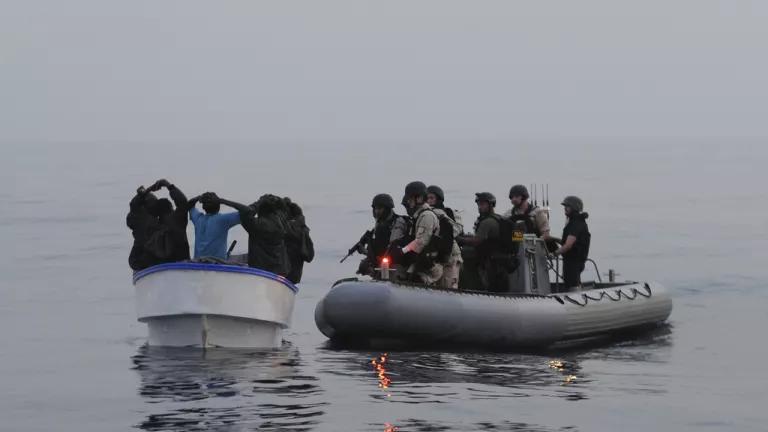Climate Change, Ahoy!
A new study says the Horn of Africa is going to get hotter and drier, driving poverty and piracy.

Not many scientists get shot at as part of their research. OK, there’s Indiana Jones—but, even among fictional scientists, he’s an outlier.
The fictional became reality in 2001, when the research vessel Maurice Ewing was navigating the Gulf of Aden between Somalia and Yemen. The ship came under attack from pirates, slaloming through a hail of rocket-propelled grenades, and was forced to abandon its experiments early.
Another research vessel, the Pelagia, only managed to collect sediment cores in the area by shutting off all its lights and imposing radio silence. “It was like the Wild West out there,” Peter deMenocal, a paleoclimatologist from Columbia University who was onboard, later said.
His research, describing the rapid climatic shift that brought the Sahara Desert into being, was published in Science in 2013.
On Friday, deMenocal published another study in the journal Science Advances, again using sediment cores collected from the pirate-infested waters of the Gulf of Aden. And this time, his results relate to the pirates themselves. The study predicts that the Horn of Africa is going to get significantly drier in the coming decades.
What does that have to do with pirates? Many observers believe that climate change is driving extreme poverty and hunger in East Africa. And that poverty, in turn, leads people to turn to piracy. “Piracy often occurs when there is poverty and a weak or nonexistent government,” writes Brian Wilson, a lawyer, naval officer, and former oceans policy advisor in the Department of Defense. “Maritime crime spiked off the Somali coast in 2008, in part because of the dire economic situation within that country.”
Lee Gunn, a retired vice admiral and one of the people responsible for withdrawing U.N. peacekeepers from Somalia in 1995, saw it firsthand. “The climate change, in part, is moving the margins in third-world areas that have normally defined the folks who are cultivators and the folks who are collectors and foragers,” he said in 2013. “[T]here are no opportunities, there’s no education….It’s a survivalist kind of social and cultural infrastructure there.” Gunn believes these factors turned Somalia into a breeding ground for piracy and terrorism.
According to Friday’s study, things are going to get worse for Somalia as well as Djibouti and Ethiopia. Again, deMenocal, along with lead author Jessica Tierney, an associate professor at the University of Arizona, analyzed seabed sediment cores. (On this trip, their research ship, the Pelagia, turned off its lights in order to evade pirates.) The samples helped the scientists determine the moisture patterns in East Africa over the last 40,000 years. The team then compared those trends to temperature conditions on the planet as a whole over the past two millennia. A clear pattern emerged.
“What we see in the paleoclimate record from the last 2,000 years is evidence that the Horn of Africa is drier when there are warm conditions on earth and wetter when it is colder,” says Tierney.
The findings run contrary to conventional wisdom. The International Panel on Climate Change forecasts more moisture for the Horn of Africa as the planet warms. Some models predict as much as 10 percent to 15 percent more rainfall by the end of the century.
The inconsistency between the two sets of data provides an opportunity to refine our models on how global weather patterns could affect the region’s climate. Until that research is complete, we’ll have to wait for deMenocal to publish the third study from his pirate adventures. I love a good trilogy. Hopefully he’ll stop there, though. The fourth installment is always a letdown.
A previous version of this story incorrectly stated that Peter deMenocal was onboard the Maurice Ewing when it came under attack from pirates in 2001.
This article was originally published on onEarth, which is no longer in publication. onEarth was founded in 1979 as the Amicus Journal, an independent magazine of thought and opinion on the environment. All opinions expressed are those of the authors and do not necessarily reflect the policies or positions of NRDC. This article is available for online republication by news media outlets or nonprofits under these conditions: The writer(s) must be credited with a byline; you must note prominently that the article was originally published by NRDC.org and link to the original; the article cannot be edited (beyond simple things such grammar); you can’t resell the article in any form or grant republishing rights to other outlets; you can’t republish our material wholesale or automatically—you need to select articles individually; you can’t republish the photos or graphics on our site without specific permission; you should drop us a note to let us know when you’ve used one of our articles.

Looking for Climate Connections (and Berries) Through Traditional Indigenous Knowledge
How to Make an Effective Public Comment
From Dams to DAPL, the Army Corps’ Culture of Disdain for Indigenous Communities Must End